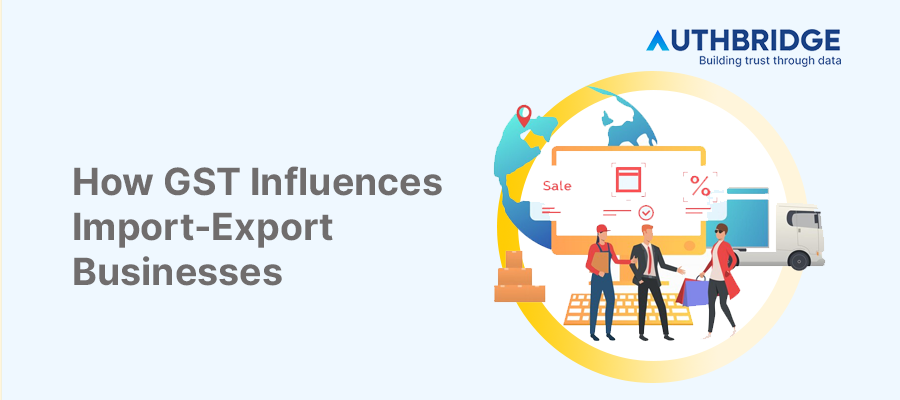Demystifying GST For Importers & Exporters In India: A Comprehensive Guide

Introduction to GST for International Trade
The Goods and Services Tax (GST) has significantly impacted the way international trade is conducted in India. By streamlining the tax structure and introducing the concept of 'One Nation, One Tax,' GST has aimed to make Indian goods and services globally competitive.
Overview of GST on Imports and Exports
GST has replaced multiple indirect taxes with a single tax, simplifying the tax regime for importers and exporters. It has introduced the concepts of 'zero-rated supply' for exports and integrated GST (IGST) on imports to ensure that Indian businesses remain competitive in the global market.
Key Concepts Under GST for International Trade
Under GST, imports are treated as inter-state supplies and attract IGST, while exports are considered 'zero-rated supplies,' meaning exporters can claim a refund of the GST paid on inputs. Special provisions also apply to the import and export of services.
GST on Imports
The import of goods and services into India is subject to IGST, which is levied in addition to the applicable customs duties. This section explores the GST rates, input tax credit mechanism, and compliance requirements for imports.
GST Rates for Imported Goods
IGST rates on imported goods are determined based on the harmonized system of nomenclature (HSN) code of the goods. The IGST paid on imports can be utilized as input tax credit by the importer, subject to GST compliance.
Integrated Goods and Services Tax (IGST) on Imports
IGST is calculated on the value of the imported goods, including any customs duty or other charges levied by the government. For imported goods, the GST is levied at the point of entry, and the importer is responsible for the payment of IGST.
Input Tax Credit (ITC) for Importers
Importers can claim ITC on the IGST paid on imports, provided the goods and services are used for business purposes. This helps in reducing the cost of inputs for businesses engaged in international trade.
Compliance and Documentation for Imports
Importers are required to furnish details of their imports in their GST returns and maintain proper documentation, including bills of entry and GST payment receipts, to claim ITC and ensure compliance with GST regulations.
GST on Exports
Exports from India are treated as zero-rated supplies under GST, allowing exporters to claim a refund of the GST paid on inputs used in the production of exported goods and services.
Zero-Rated Supplies and Exports
Under GST, exports are categorized as zero-rated supplies, enabling exporters to either supply goods or services under a bond or Letter of Undertaking (LUT) without paying GST or pay GST and claim a refund subsequently.
Refund Mechanism for Exporters
Exporters can claim a refund of the input tax credit on the GST paid on inputs used in the manufacture of exported goods. The refund process has been streamlined under GST to facilitate quick reimbursement to exporters.
Export Promotion Schemes under GST
The Indian government has introduced various schemes such as the Export Promotion Capital Goods (EPCG) Scheme, the Duty-Free Import Authorization (DFIA) Scheme, and the Advance Authorization Scheme to facilitate the export of goods and services without payment of customs duty and GST or with payment of customs duty and GST at a reduced rate.
Documentation and Compliance for Exports
Exporters must comply with specific documentation and filing requirements under GST, including the submission of shipping bills, export invoices, and GST returns, to avail of the benefits of zero-rated supplies.
Special Provisions for Importers and Exporters
Special provisions under GST cater to the unique needs of importers and exporters, particularly in the context of service transactions.
Import and Export of Services
The import of services is subject to IGST under the reverse charge mechanism, where the recipient of the service is liable to pay GST. This ensures that imported services are taxed similarly to domestic services, maintaining a level playing field.
Impact on Special Economic Zones (SEZs)
SEZs are treated preferentially under GST, with supplies to SEZ units considered zero-rated. This facilitates the import of goods and services into SEZs without the payment of IGST, promoting investment and export-oriented activities.
E-Way Bill Requirements for International Trade
The e-way bill system applies to the movement of goods across Indian borders, requiring importers and exporters to generate e-way bills for consignments valued over a certain threshold. This ensures the tracking of goods and compliance with GST regulations.
Challenges and Solutions in GST Compliance
Despite the benefits, GST compliance poses challenges, especially for small and medium-sized enterprises (SMEs) engaged in international trade.
Common Compliance Challenges for Importers and Exporters
Challenges include understanding the complex GST laws, managing the increased compliance burden, and dealing with technological issues related to the GST portal.
Best Practices for GST Compliance in International Trade
Adopting technology solutions for GST compliance, staying updated with GST laws, and seeking professional help can mitigate these challenges. Regular training and awareness among staff about GST compliance are also crucial.
Future Outlook and Recommendations
The future of GST in international trade looks promising, with potential for further simplification and rationalization of tax rates and compliance procedures.
Anticipated Changes in GST Policies for International Trade
Ongoing discussions and feedback from the industry could lead to reforms in GST rates, simplification of compliance procedures, and more clarity on various provisions.
Enhancing Ease of Doing Business for Importers and Exporters
Efforts to enhance the GST framework, including improving the GST portal, simplifying compliance procedures, and providing clearer guidelines for stakeholders, will be key to supporting the growth and global competitiveness of Indian businesses engaged in international trade.
Category

Abhinandan Banerjee
(Associate Manager - Marketing)
Abhinandan is a dynamic Product and Content Marketer, boasting over seven years of experience in crafting impactful marketing strategies across diverse environments. Known for his strategic insights, he propels digital growth and boosts brand visibility by transforming complex ideas into compelling content that inspires action.



